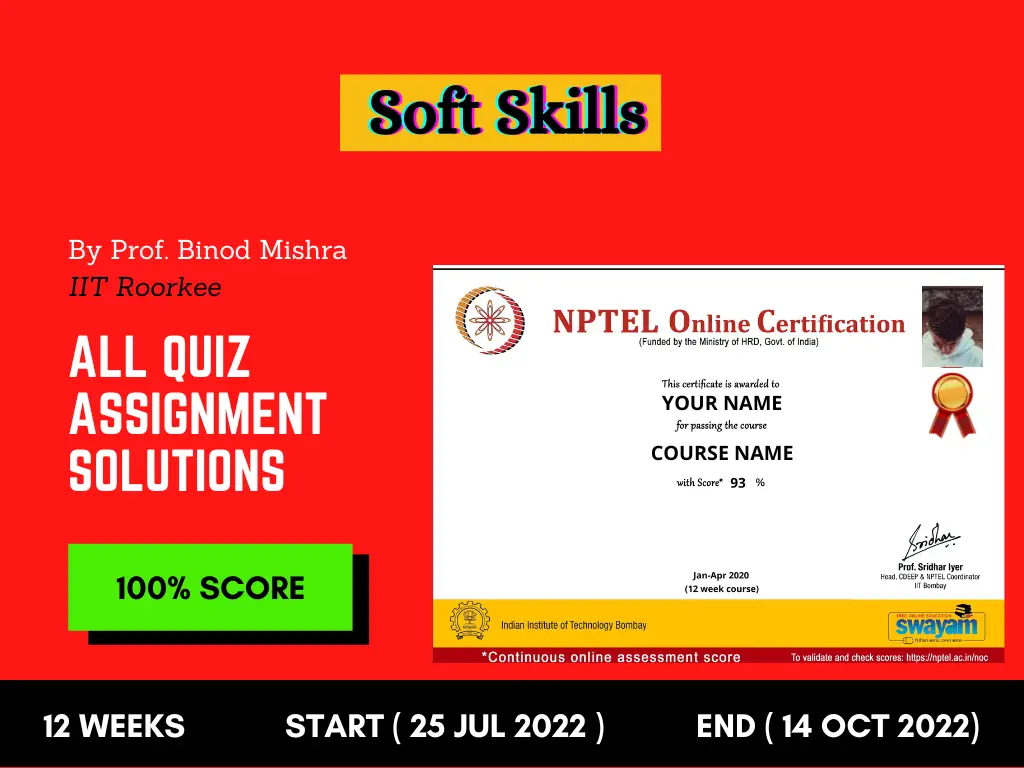This set of MCQ(multiple choice questions) focuses on the Soft Skill Development NPTEL Week 8 Solutions.
Soft Skills, a buzz word today, has attracted the attention of students, professionals and entrepreneurs all over the world. Every individual wants to get a coveted job. In a fast changing world, it’s important to prove multiple skills in different situations. The course aims at creating awareness among the stock holders of the corporate world in which the role of individuals as team players and also as responsible leaders materializes to a great extent. The course, with its interactive and need based modules, will address various challenges of communication as well as behavioural skills faced by individuals at workplace and organizations in bridging the gaps through effective skills of interviews, group discussions, meeting management, presentations and nuances of drafting various business documents for sustainability in today’s global world.
Course layout
Answers COMING SOON! Kindly Wait!
Week 1: Assignment answers
Week 2: Assignment answers
Week 3: Assignment answers
Week 4: Assignment answers
Week 5: Assignment answers
Week 6: Assignment answers
Week 7: Assignment answers
Week 8: Assignment answers
Week 9: Assignment answers
Week 10: Assignment answers
Week 11: Assignment answers
Week 12: Assignment answers
NOTE: You can check your answer immediately by clicking show answer button. Soft Skill Development NPTEL Week 8 Solutions” contains 15 questions.
Now, start attempting the quiz.
Soft skill development NPTEL week 8 Solutions
Q1. According to Eilam and Aharon 2003), Time management can be viewed as a way of monitoring and controlling time.
a) Correct
b) Incorrect
Answer: a) Correct
Q2. Self-reliance is believing on yourself that comes through practice and experience that leads to confidence in yourself.
a) True
b) False
Answer: a) True
Q3. Work-family conflict is __________ in nature.
a) unidirectional
b) bi-directional
Answer: b) bi-directional
Q4. According to the Factories Act 1948, women employees are restricted during which hours of working?
a) 7PM to 6AM
b) 4PM to 3AM
c) 6PM to 5AM
d) 8PM to 7AM
Answer: a) 7PM to 6AM
Q5. Which of the following are the obstacles to manage our time effectively?
a) Unclear objectives or goals
b) Stress and fatigue
c) Periods of inactivity
d) All of the above
Answer: d) All of the above
Q6. Which of the following is the best strategy for planning out your time?
a) Prioritize all your tasks
b) Delay any unnecessary work
c) Delay all the unexpected work
d) All of the above
Answer: a) Prioritize all your tasks
Q7. In which resilience strategy, life skills are taught by organizing a boys and girl club?
a) Risk-focused strategy
b) Asset-focused strategy
c) Process-focused strategy
d) None of the above
Answer: b) Asset-focused strategy
Q8. The impact of experiences is transferred from the work domain to the non-work domain either in a negative or a positive way. This process of transmission was explained by:
a) Segmentation model
b) Spillover model
c) Compensation model
d) Conflict model
Answer: b) Spillover model
Q9. Emotional intelligence is not applicable in which of the following situations in the workplace?
a) An emergency where fire breaks out on the sixth floor of an office building
b) An IQ test conducted by the authorities for promotions
c) Serving tea inside a conference room
d) None of the above
Answer: b) An IQ test conducted by the authorities for promotions
Q10. Fitting the company culture despite having personal reservations about it is an example of
a) Stress management
b) Emotional intelligence
c) Work life balance
d) None of the above
Answer: b) Emotional intelligence
Q11. According to which model, stress occurs when environmental demands of the job are perceived to exceed the control (D>C) and ability of the individual needed to interact with those demands.
a) Inverted U curve
b) Lewin’s field theory
c) Demand control model
d) None of the above
Answer: c) Demand control model
Q12. Economic uncertainty, political uncertainty, and technological uncertainty are some of the ______________ stressors that affect work preformance.
a) environmental
b) organizational
c) individual
d) institutional
Answer: a) environmental
Q13. Which of the following symptoms are considered as the consequences of stress?
a) Physiological
b) Behavioral
c) Interpersonal
d) All of the above
Answer: d) All of the above
Q14. Consider the following statements:
A. Resilience is the ability to perform effectively under pressure.
B. Resilience is the ability to bounce back from adverties/difficulties.
C. Resilience is the ability to manage health and well-being
a) Only A is correct
b) Only A and B are correct
c) Only A and C are correct
d) All A, B, and C are correct
Answer: d) All A, B, and C are correct
Q15. Consider the following statements.
A: Smiling in the workplace falls under the ambit of workplace etiquette; it should be used as a strategy to make amicable solutions to conflicting situations.
B: According to emotion induction empathetic engagement with a depressed person can ifect on with depression.
a) A and B are true
b) A is true but B is false
c) B is true but A is false
d) A and B are false
Answer: a) A and B are true
<< Prev- Soft Skill Development Week 7 Assignment Solutions
>> Next- Soft Skill Development Week 9 Assignment Solutions
DISCLAIMER: Use these answers only for the reference purpose. Quizermania doesn't claim these answers to be 100% correct. So, make sure you submit your assignments on the basis of your knowledge.For discussion about any question, join the below comment section. And get the solution of your query. Also, try to share your thoughts about the topics covered in this particular quiz.
Checkout for more NPTEL Courses: Click Here!

